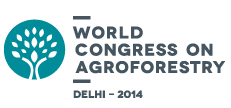A tool for more sustainable fuel use? Carbon finance for cookstoves in India
A tool for more sustainable fuel use? Carbon finance for cookstoves in India
wca2014-1592 Olivia Freeman 1,*Hisham Zerriffi 2 1Institute of Resources, Environment and Sustainability, 2Liu Institute for Global Issues, University of British Columbia, Vancouver, CanadaReplacing less efficient traditional cookstoves with improved models of stoves has the potential to create a number of social and environmental benefits. Increased burning efficiency leads to reduced fuel demand, while emissions reductions of particulate matter and climate forcing species lead to both improved health and climate change mitigation. In India the majority of the population still lacks access to clean cooking stoves or facilities. With 90% of the rural population and 31% of the urban population still primarily depending on solid fuels for cooking, the switch to using improved stoves has the potential to greatly reduce the demand on biomass fuel resources while also improving livelihoods and addressing climate change. On this basis, there have been a number of cookstove dissemination initiatives in India, home to a past national cookstove program, many NGO efforts and a slew of commercial initiatives. Still overall none of the disseminations efforts have been successful at achieving both significant distribution scale and sustainability. Carbon finance provides an opportunity to address some barriers in dissemination, providing additional financing which can be used to subsidize stove costs making them affordable to lower income consumers, while allowing for the scaling up of dissemination efforts at the same time. Despite these potentials, actual impacts of carbon finance on cookstoves projects are not yet well known. Therefore to examine the potential of carbon financing as a tool for promoting cookstove dissemination this research looks at the impacts of carbon finance on organizational activities and business models using India as a case study. Results based on 19 semi-structured interviews provide an overview of different organizational approaches employed, perceptions around carbon financing from both those choosing to and not to apply for carbon certification, and identification of the opportunities, challenges and unknowns surrounding the use of carbon finance for cookstove dissemination.

